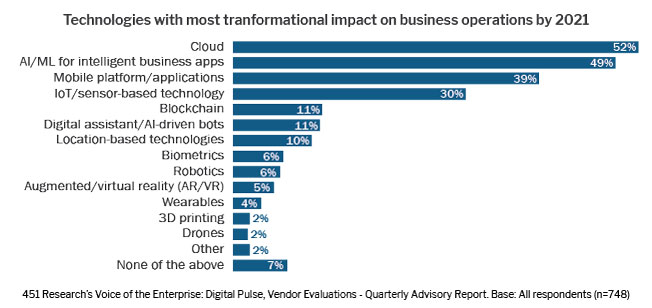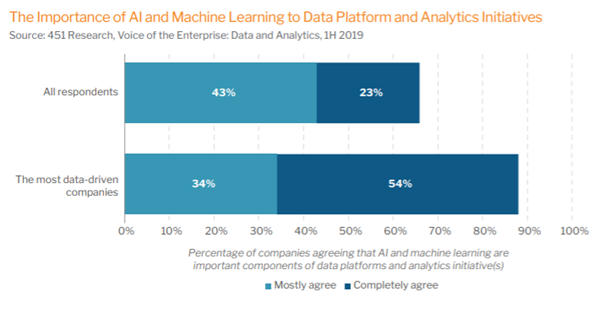Robots this. Robots that. Why do robots get to roll around, making beeping noises, but when I do it, it's "unprofessional" and "getting in the way of the coffee machine"?

But I will give AI and Machine Learning this - it's have really streamlined most parts of digital and data strategy. We all know that customer's expectations are higher than ever, be it with personalisation, customer experience, or data privacy. And this means marketers are stretched pretty thin.
As a result, the adoption of the tech has gone through the roof. In fact, a 2020 Deloitte global survey of early AI adopters showed that three of the top five AI objectives were marketing-oriented: enhancing existing products and services, creating new products and services, and enhancing relationships with customers.
So, combining well-managed AI and ML strategies, alongside clean correlated data, there's the potential for great results.
Why should you use AI and ML in your data management?
Well, not to tell you to follow the crowd, but marketers are currently loving AI.
In fact, 451Research’s Voice of the Enterprise AI and ML 2H 2018 survey found that 68% of respondents already had or were actively planning machine learning projects, and 92% of those in the production or PoC stages have positive opinions about the performance of their ML projects to date.
Plus, an August 2019 survey by the American Marketing Association even found that implementation of AI had jumped 27% in the previous year and a half.

This is almost certainly due to the ability of AI to speed up cumbersome, time-consuming processes.
“AI algorithms can analyse data sets that would take humans years or longer. Take, for example, the human genome project," says Mike O'Malley, SVP of SenecaGlobal.
"Scientists started the project in 1990 and finished in 2003. It took thirteen years to create a remarkable advancement in the science of fighting genetic disease. Data scientists using AI can now repeat that process in 24 hours.”
In marketing, AI uses technologies to make automated decisions based on data collection, data analysis, and all sorts of audience and trending observations . This is all based on the need for speed. Ka-chow.
AI is used by marketers to augment marketing teams, or perform tactical tasks that don't require human nuance or refinement. This means effective messaging and tailored marketing, without much intervention, and with maximum efficiency.

The growth of digital media brought with it lots, and lots, and lots of data. This provided marketers the opportunity to understand not only their customers, but their own efforts. It also means being able to attribute value across channels.
But, on the other hand, it has also meant the over-saturation of data, as marketers can struggle to determine which data is valuable, or which data sets are worth collecting.
AI and ML are defined as "disruptive enablers", or an innovation that significantly alters the way that consumers, industries, or businesses operate. They turn tech that is basically just low-level automation and streamlining, into systems which can act intelligently on what they've previously learned. So, AI's need for vast amounts of data can't help but transform data management.
Plus, adaptive automation and ML will allow data management software and platforms to act in smarter ways, by observing and leveraging patterns - something that would previously be time-consuming, and run the risk of human error. But remember, AI is only as good as the data it's provided with.
Where can AI and ML be used?
AI marketing use cases can include:
- Data analysis
- Natural Language Processing
- Automated decision making
- Content generation
- Personalisation
- Improving query performance
As companies pursue the goal of being more insight-driven, they'll need to adopt new technologies and methods that facilitate this.
So, with AI, and as a result Machine Learning, and Deep Learning, marketers can embed the efficiency of the tech at the data level. This ensures that AI can enable the full scope of the data management lifecycle, from ingestion, to curation, to discovery. Plus, it can drive applications that are built on that data.
Machine learning can be used to drive programmatic buying in online advertising, e-commerce recommendation engines, and sales propensity models in Customer Relationship Management, or CRM, systems.
AI can streamline this sales process by using highly detailed data on individuals to create personalised product or service offers. This can also lead to upselling and cross-selling down the line. One example of this can be 'abandoned cart' messages, using prompts and testimonials to help close the sale.
According to Conversica, at least 33% of marketing leads are not followed up by the sales team. But with AI, customers can be provided with the detailed, personalised experience they want.
North Face, using IBM's AI solution Watson, enabled shoppers to buy their perfect product, based on a number of different aspects. They achieve this by asking the customer questions such as “where and when will you be using your jacket?” through voice input technology,
Watson then scans hundreds of jackets, clothes etc. and finds a match based on real-time customer input and it's own research, like weather conditions in the clients local area.
What are the challenges of AI Marketing?
Well, there's a few things. AI can be tricky. But the benefits, when it's all up and running, can be massive. Just keep in mind:
The amount of data, and skills, needed. Successful AI relies on a number of factors, including a large well of data, the relevant algorithms, expert data scientists, and compute resources, This means making sure you've not only got the correct physical and virtual server infrastructure, but also the data management and database software designed to support this level of data processing and analytics.
AI is still a new(ish) technology. Full-enabled AI databases are in the relatively early stages, with only a few vendors working on this form of initiative. Though, there are already some data management systems out there, that have the "benefit embedded AI capabilities or functionality that supports AI-related activities," according to 451 Research.
"In the case of the former, we see built-in capabilities for workload management, for example, while the latter scenario includes functionality to support activities such as building and working with data science frameworks and tools."
Plus, because the tech is new-ish, definitive best practices have not been established to guide your team's initial deployments.
Training time. AI tools have to learn, just like anyone else. They can require a good deal of time and training to learn which actions to take to achieve marketing goals, customer preferences, historical trends, and content. This also requires data quality assurances. So, if the AI is not learning from data which is of high quality, the value of the tool will be decreased significantly.
Privacy. The significance of privacy has been pushed by regulating bodies and consumers alike. So, teams have to be careful to ensure they're using data ethically, and in compliance to data privacy laws. Going against this means big fines, and reputation damage. This can be a challenge where AI is concerned.
Hard to demonstrate value to stakeholders. It can be difficult for teams to clearly prove the value of AI and ML investments. While KPIs like ROI can be easily shown, more nebulous qualities like improved customer experience, or brand reputation, are harder to quantify.

